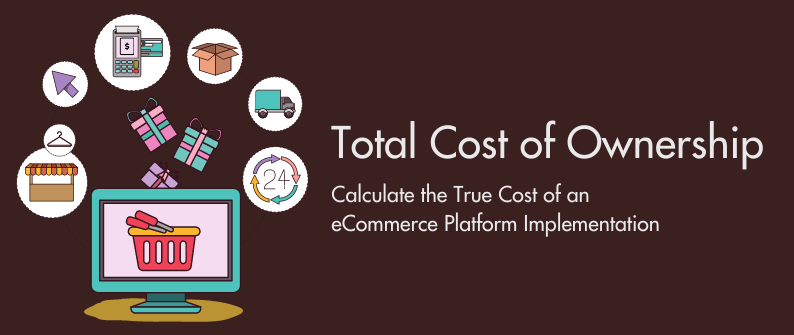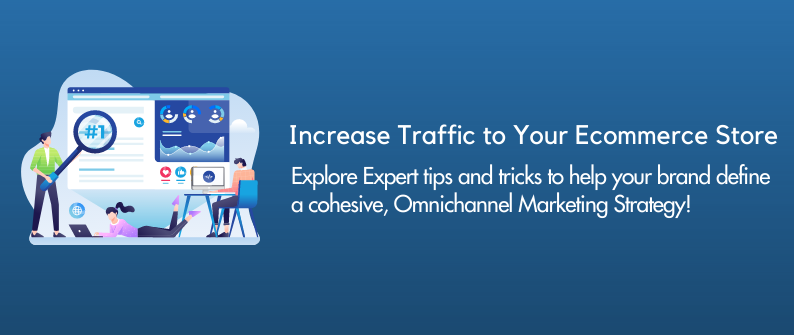Building and managing an eCommerce store is a crucial task, which may not be accomplished accurately until you’re completely aware of the investment you may put in. It’s essential to ensure you’re not charged with any hidden cost surprises while you exert and operate your store online.
While you’re setting up an eCommerce platform, your investment not only depends on the license fee but is also inclusive of a number of other factors. A few of these factors include third-party apps, ongoing maintenance with solution partners, optimization, and many more.
With this blog, we aim at providing an overview of the total cost of ownership (TCO) and how you can better understand it.
What is a Total Cost of Ownership (TCO)?
In layman’s terms, TCO can be referred to as the sum of all costs and expenses required to buy, execute, and manage your eCommerce business. From back end platform management payments to online marketing funds, TCO is inclusive of everything that demands you to spend money on your web store or online business.
Under the broad umbrella of calculating TCO, you might have to include licensing costs, maintenance, support charges, extension purchases, payment gateways, and much more. To do justice in calculating the total cost of ownership, you might view or mark every minor to major spending done to establish your online business.
What does a Total Cost of Ownership Include?
As discussed, there are numerous verticals to consider while calculating the total cost of ownership (TCO). To make things easy for you, we have created a short checklist that must be considered while calculating the TCO of an eCommerce solution.
Taking all the primary and trivial efforts to build an eCommerce store, let’s bifurcate the costs under following categories:
- Costs to Build Infrastructure
- Costs to Design Store
- Building/Development Costs
- Ongoing eCommerce Costs
Below is a quick checklist of the sub-pieces to consider within each cost category listed above.
Infrastructure Costs
Whatever be the size of your business or budget, you have to pay for certain kinds of initial business set up jobs, which includes:
- Domain name
- Web Hosting
- eCommerce software
- SSL Certificate
- Store theme and designs
Design Costs
Next, you must ensure delivering an impeccable user experience through your eCommerce website. In today’s competitive world, your store must create its own unique experience with a streamlined process for customers to make a purchase.
To accomplish this, you will have to bear the standard design costs:
- Store Theme (template themes and frameworks)
- Add ons, plugins, or extensions (vary as per the eCommerce platform)
In case you’re designing the site yourself, you might have to put much time, money, and resources into it. This step can lead to a long time to market, high costs, and recurring mistakes.However, while working with an eCommerce development agency, you won’t encounter any issues, as they’ve already figured out how to avoid the majority of such common setup errors.
Store Building Costs
Above-listed costs were all about setting up a framework or, say, your eCommerce site’s structure. Now to build a store that offers a valuable experience to your customers, it’s essential to add a few relevant functionalities and features such as:
- Displaying products online
- Managing Inventory
- Processing Online Orders
- Shipping Details
- Setting up Payment Gateways
Implementing the above functionalities will incur the cost of the following:
- Back-end web development
- Front-end web development
- Mobile app design
- Custom software development
- eCommerce Services
- UI/UX design
- Digital Strategy
Ongoing Maintenance Costs
So, your eCommerce store is all set to accept orders and ship them in the most organized manner. To ensure the process flow runs smoothly, there are some ongoing fees you must consider.
A few standard ongoing maintenance costs associated with eCommerce stores are as follows:
- Data Backups (saving customer data and product information)
- Inventory Management (third-party warehouse or Dropshipping)
- Product Marketing (SEO, SMM, PPC)
- Email Marketing (Newsletters)
- Security (SSL certificate and others)
Not to forget, you will have to bear the yearly domain name and hosting costs. Also, if you have chosen a SaaS-based eCommerce platform, you might have to pay for its subscription as well.
Why Choose an eCommerce agency over an in-house team?
Choosing an eCommerce development agency over an in-house team helps save time, money, and a lot of effort. Moreover, there lies flexibility in hiring an eCommerce agency for building your online store.
The cost of operating your online store with an agency would vary as per the services you ask them to handle for you. A top eCommerce agency will always understand your requirements and provide a suitable cost estimate for the required services.
In case you’re in uncertainty, you must hire an experienced eCommerce agency if:
- You don’t have in-house tech resources. Hiring managers, developers, and executives can be a tedious and pricey responsibility. An agency will provide you everything you need to build an eCommerce under their service umbrella.
- You demand rapid deployment of your online store. Agencies are equipped with experts, knowledge, and ready resources to launch your eCommerce store within a few weeks’ time.
- You have a limited budget. Most merchants believe it’s cheaper to manage and pay an in-house team to build and maintain an eCommerce store. But it’s untrue. If you want to set up an eCommerce store with minimum flaws and at an affordable cost, experienced professionals from an outsourced eCommerce agency are the best possible solution.
Wrapping it up
Calculating the Total Cost of Ownership for an eCommerce business is not as simple as licensing fees. There are numerous verticals involved in determining the TCO. Whether calculated in-house or outsourced to an accounting company, your TCO must include the above-listed primary categories’ expenditure.
We hope this blog sheds light on your understanding of TCO and what factors must be considered while calculating it. Let us know if you have any queries about it!
Moreover, we would like to chime in here and introduce ourselves as one of the top-rated eCommerce development solutions partners.
If you’re planning to build an eCommerce Store in 2021? We can help you create one at an affordable cost with our Rapid Deployment Packages. Contact us now!


























